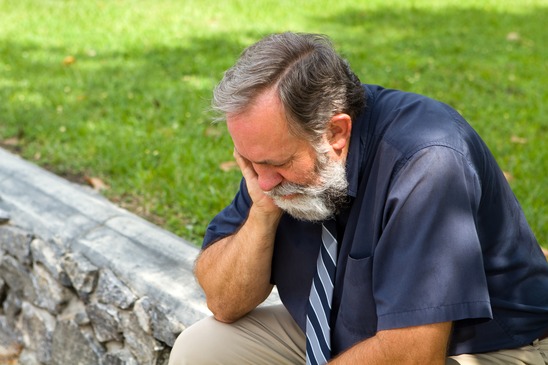The Importance of Hope During Recession
|
Reading time: 6 minutes
|

Scientific Study: How to Save a Life During a Recession
You’ve come across hard economic times.
What do you believe?
Will you get out of it okay? Will things pick up? Will you find a good job again?
Whether you think so or not, how you perceive a situation can have a very real effect on your life and the lives of others. A new study shows that how people perceive the economy and job market can be a life or death matter.
Negative Times. Negative Reactions.
In times of job uncertainty and economic decline, people are more prone to taking their own life. At least, that’s what the numbers show.
A study performed in the United Kingdom compared suicides rates and the economic decline of 2008 to 2010. During this recession, both male and female suicide rates increased by about 8%.
This isn’t just being depressed about ‘hard times’.
In the past, the suicide rates have also gone up alongside unemployment rates. In years where unemployment rates increase by 10%, male suicide rates increase by 1.4%.
However, during the 2008-2010 recession, the unemployment rate rose around 26 percent each year. Male suicide rates jumped up by a whopping 3.6%. These aren’t high percentage numbers, but when people are dying, it’s time to be concerned.
There’s evidence that it’s not just coincidence, too. As the economy rose out of the recession, suicide rates started to decrease. When people started to find jobs again, suicide rates dropped.
There might be something that’s affecting both of these statistics behind the scenes. No good scientist would deny that. But these numbers clearly point to a relationship between the economy, employment, and suicide.
Now, here’s what you can do to fight it.
How to Save a Life
Do you know someone going through hard times or a long unemployed stretch?
Remind them that being broke or unemployed isn’t the end of the world. There’s always something that can be done. Hard times don’t last forever.
The key is to put yourself or someone you know in a better state of mind. Don’t underestimate just how strong this affect can be. Statistics don’t lie, and they’ve clearly demonstrated that a negative point of view can have dangerous consequences.
Just imagine what a positive point of view could do.
- Take some time out to breathe. Step outside and watch the world go by, even if it’s just for 5 minutes.
- Enjoy the simple pleasures again. It worked when you were a kid, so it’s worth a try now.
- Remember that life is about more than money.
- If unemployment is a concern, take a moment to think about how much more people are than their jobs. People are wives, mothers, husbands, fathers, and all kinds of other things.
Some people might think that this ‘positive thinking’ stuff won’t work. They think that things ‘are as they are’ and nothing can change that.
Here’s a quick story that demonstrates the power of names, labels, and perception:
A toy company wanted to start marketing dolls to boys. Naturally, many people thought that this was a horrible idea.
“What boy would want to play with a doll?” they asked.
Of course, a quick walk through the toy section of a store today will show you just how popular dolls for boys are.
Except they’re not called dolls. They’re action figures.
Semantics? Yes.
Made a huge difference and a ton of money? Yep, did that too.
Names are powerful. Perceptions can alter reality. The next time things seem hopeless, out of control, or like they’re never going to end, remember that a good portion of it is actually just in your head.
That’s the power of a good idea.
Thinking You’re Sick Can Make You Sicker: Clinical Study

Heard of the placebo effect?
What about its sister, the nocebo effect.
The nocebo effect is like the placebo effect, except in reverse. A placebo, also called a sugar pill, looks like medicine but actually doesn’t have any active ingredient.
Placebos are used to test whether or not people’s minds are just fooling them into thinking they feel better. That way, researchers can test if a drug really, actually works. Or not.
The nocebo effect is when a person experiences negative results from the power of their mind. Maybe a person takes a pill and believes it will do nothing. Or, maybe a patient hears a negative suggestion from someone they trust. The nocebo effect makes these real, just like placebos.
Real Results with Suggestion Alone
Nurses and doctors can affect their patients just by talking about bad results or having a poor attitude about a treatment. Just hearing these ideas can color your perceptions.
Moreover, if you think a treatment won’t work or believe that you’re bound to have complications, then it’s likely that you will.
It’s the nocebo effect in action.
The power of the mind is a lot stronger than people give it credit for. Rationally, it seems silly to think that something as simple as ‘positive thinking’ can have such drastic effects.
But, placebos have been shown to work, under certain circumstances. And the nocebo effect is getting more and more clinical attention.
Here’s an example. One chronic back pain research study split patients into two groups. The first group was told that they would not experience pain during a leg-flexing test. The other group was warned that they might feel more pain.
The results? The warned group did not perform as well as the first group. They even reported feeling more pain. The first group reported no change.
What you believe can come to be, whether it’s true or not.
Use Your Thoughts to Your Advantage
It’s simple advice and not all that new: think positive.
Staying positive about a procedure or treatment can increase your odds of positive results. Be aware of what you’re thinking and expecting. After all, these thought have a very real impact on how you’ll feel once all is said and done.
You have the power to change things based on how you perceive it. Negative situations can be turned around and even improved.
Take a strong stance. Believe that a certain treatment will work and that your condition will improve.
Best case scenario: your condition does actually improve.
Worst case scenario: you’re not dwelling on negativity and are happier overall.
There’s nothing to lose.
Information provided on this website is for general purposes only. It is not intended to take the place of advice from your practitioner







